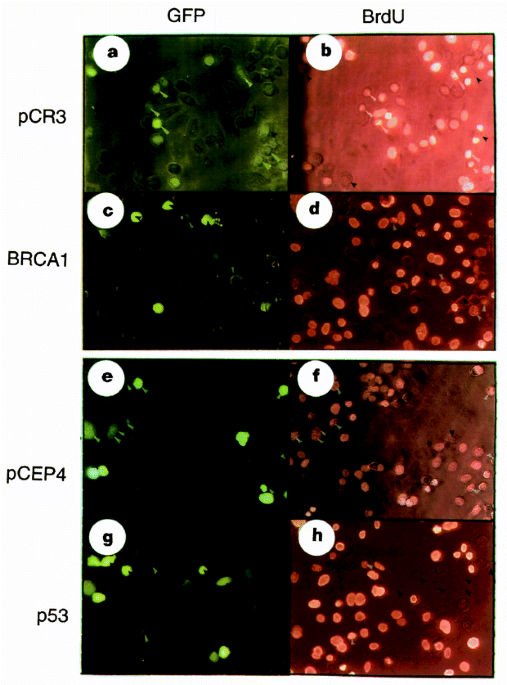Arrest of the cell cycle by the tumour-suppressor BRCA1 requires the CDK-inhibitor p21WAF1/CiPl
- Select a language for the TTS:
- UK English Female
- UK English Male
- US English Female
- US English Male
- Australian Female
- Australian Male
- Language selected: (auto detect) - EN

Play all audios:

Much of the predisposition to hereditary breast and ovarian cancer has been attributed to inherited defects in the BRCA1 tumour-suppressor gene1,2,3. The nuclear protein BRCA1 has the
properties of a transcription factor4,5,6,7, and can interact with the recombination and repair protein RAD51 (ref. 8). Young women with germline alterations in BRCA1 develop breast cancer
at rates 100-fold higher than the general population3, and BRCA1-null mice die before day 8 of development9,10. However, the mechanisms of BRCA1-mediated growth regulation and tumour
suppression remain unknown. Here we show that BRCA1 transactivates expression of the cyclin-dependent kinase inhibitor p21WAF1/CIP1 in a p53-independent manner, and that BRCA1 inhibits
cell-cycle progression into the S-phase following its transfection into human cancer cells. BRCA1 does not inhibit S-phase progression in p21−/− cells, unlike p21+/+ cells, and
tumour-associated, transactivation-deficient mutants of BRCA1 are defective in both transactivation of p21 and cell-cycle inhibition. These data suggest that one mechanism by which BRCA1
contributes to cell-cycle arrest and growth suppression is through the induction of p21.
This work was supported by grants from the NIH and the Breast Cancer Research Foundation to B.L.W. W.S.E.-D. is an assistant investigator of the Howard Hughes Medical Institute.
Kumaravel Somasundaram and Hongbing Zhang: These authors contributed equally to this study.
Laboratory of Molecular Oncology and Cell Cycle Regulation, Howard Hughes Medical Institute, University of Pennsylvania School of Medicine, Philadelphia, 19104, Pennsylvania, USA
Kumaravel Somasundaram, Yi-Xin Zeng, Gen Sheng Wu & Wafik S. El-Deiry
Departments of Medicine, University of Pennsylvania School of Medicine, Philadelphia, 19104, Pennsylvania, USA
Kumaravel Somasundaram, Hongbing Zhang, Yi-Xin Zeng, Yi Peng, Hongxiang Zhang, Gen Sheng Wu, Barbara L. Weber & Wafik S. El-Deiry
Departments of Genetics, University of Pennsylvania School of Medicine, Philadelphia, 19104, Pennsylvania, USA
Departments of Cancer Center, University of Pennsylvania School of Medicine, Philadelphia, 19104, Pennsylvania, USA
Brookdale Center for Developmental and Molecular Biology and Department of Medicine, The Mount Sinai School of Medicine, New York, 10029, New York, USA
Anyone you share the following link with will be able to read this content: